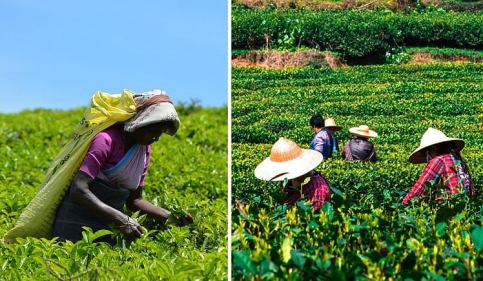
Celebrating the 16th International Tea Day in the time of Covid 19: Lessons and Challenges
The COVID 19 pandemic and subsequent lockdowns have plunged tea plantation workers and small tea growers into a devastating socio-economic and humanitarian crisis. Suffering from generational deprivations, for them quality healthcare, education and decent livelihood have always been a distant dream. Majority of this working population is women. On the 16th International Tea Day (21st May), let us not forget them and resolve to support them in this worsening scenario.
The low wageshave kept the working population of the tea gardens in a vicious circle of poverty adversely affecting the human development index factors such as high IMR, MMR, NER, NAR, anaemia and other preventable diseases and infections.Though residing within the tea gardens for three to four generations, the workers do not have the right over the homestead or the house, access to proper sanitation or drinking water, making them a dependent labour force.The outbreak of COVID 19 followed by an abrupt countrywide lockdown has led to a scarcity of access to basic-necessities, almost threatening their very survival. Worse is the condition of casual workers. Payment of full wages, access to social protection and health care remain serious concerns.
Small tea growers have been swelling in numbers in the recent decades but operating under norms and the terms of engagements decided by the agents, BLFs, exporters, retailers and brands. The value they get for their produce falls quite short of being fair. Like any other informal worker, the power of rejection exerted by the bigger players is their biggest challenge. Over 80 percent of small tea growers have less than 2ha of land. During the COVID crisis, they have suffered adversely due to decreased leaf intake by factories and dwindling incomes. Poor access to public provisions has exacerbated their vulnerabilities.
Social protection and a decent livelihood is not only a necessity of tea workers and small tea growers but also for the survival of the industry. It is time for the Indian tea industry tomove beyond the colonial legacy imposed by the British imperialism and give those at the lowest end of the production chain a fair share of the value they produce. During the COVID-19 crisis, it is extremely critical that all workers not only receive their due wage and social security benefits but also receive quality healthcare, education, water and sanitation. The small tea growers’ should not be pushed into deprivation, and be enabled to access fair price and public provisions.
The decision to observe International Tea Day was taken after deliberations among various international organizations and trade unions during the World Social Forum in Mumbai, India, 2004 and Porto Alegre, 2005. In India the call to observe International Tea Day was given by the trade unions — AITUC, AICCTU, BMS, CITU, HMS, INTUC, UTUC, NTUI, and TUCC — and the Centre for Education and Communication, New Delhi. Subsequently, a one-day programme was held in New Delhi on December 15, 2005. Besides the trade union members, small growers, voluntary organizations, and academicians were among the key participants in the programme. In 2006, celebration of the ITD was organised by the Institute for Social Development (ISD) in Kandy, Sri Lanka. Since then it has observed each year world over, particularly by the tea producing countries, reaffirming the rights of tea workers and small tea growers.
It is an honour that the United Nations has recognised the International Tea Day and, hereafter,it will be observed on May 21 every year. This is the highest level of recognition for the tea community that all should cherish, avowing that rights of tea plantation workers and small tea growers would be observed in earnest.